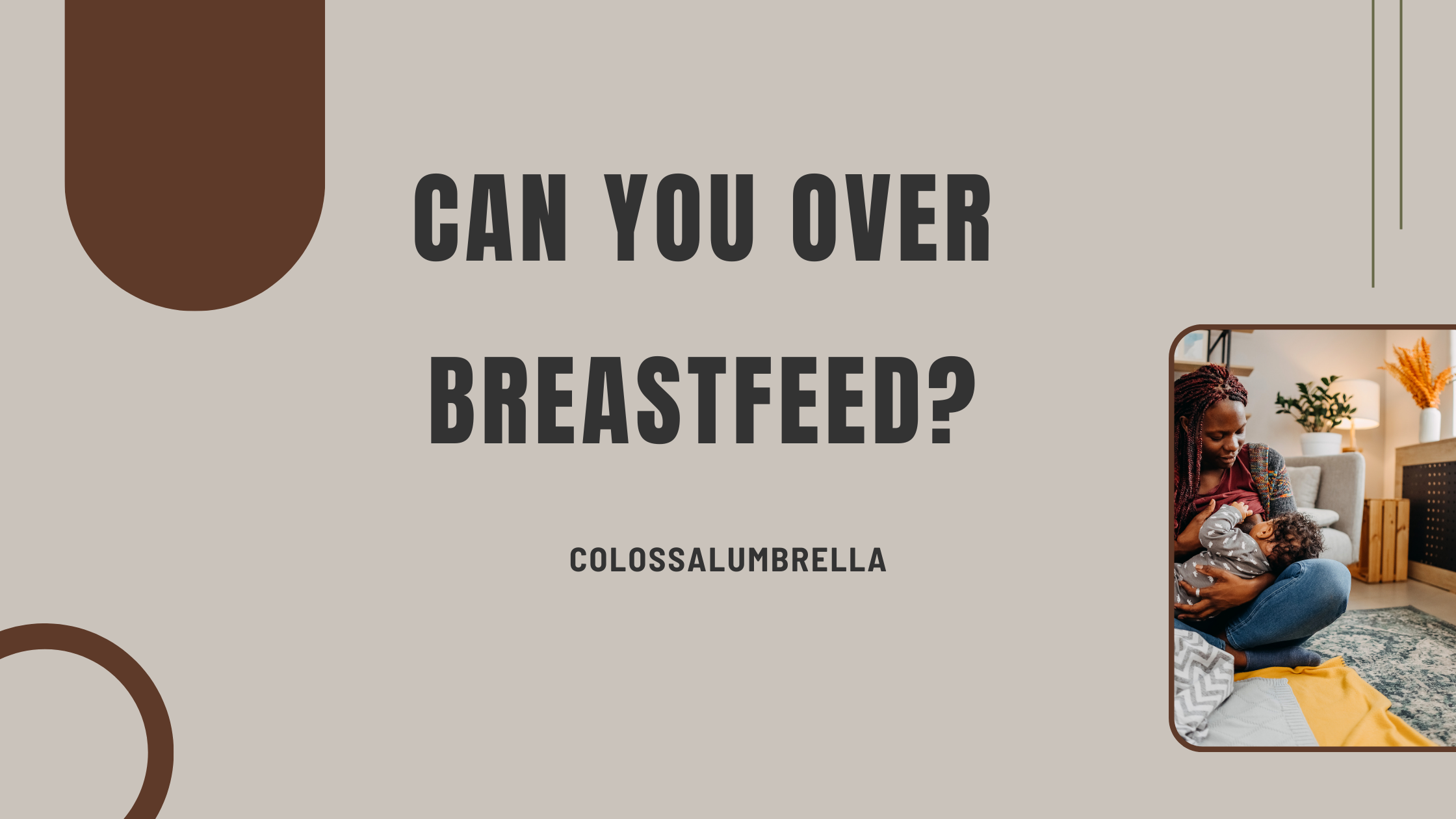Contents
You have got this sweet little newborn in your arms, and amidst all the diaper changes and baby coos, you’re wondering, “Can You Over Breastfeed?” I totally get it, you want the best for your little one and I am here with you to navigate this feeding wonderland together. Let’s talk about whether there’s a magic line between enough and too much when it comes to the milk. Breastfeeding is a beautiful and natural way to nourish your newborn, providing them with essential nutrients and fostering a strong bond between mother and child. As a new mother, you may have concerns about whether you can overfeed your baby while breastfeeding.
Subscribe to my blog for Parenting tips that will make you feel like a pro, and get access to exclusive free Printables that will keep your little ones busy and happy!
Understanding Your Baby’s Feeding Needs
The Mechanics of Breastfeeding
Before we dive into details on can you over breastfeed, it is important to understand breastfeeding and its impact on milk flow. When your baby latches onto your breast, their tongue creates a suction action that allows milk to flow into their mouth. This natural mechanism ensures that your baby receives the nourishment they need. It’s important to note that your baby will control the duration of their feed and show signs of contentment when they are finished.
The composition of breast milk is no less captivating. A dynamic blend of proteins, fats, carbohydrates, and antibodies creates an ever-evolving elixir tailored to the baby’s needs. The colostrum, the golden nectar that flows in the early days, is a gift of nature, bolstering the baby’s immune system and providing a burst of nutrients.
How Often Does a Newborn Need to Breastfeed?
Feeding on demand, an essential facet of breastfeeding, aligns with this natural rhythm. As the baby communicates their hunger, the mother responds, fostering not only physical nourishment but emotional bonding as well.
In the early stages, newborns have small stomachs and require frequent feeding. It is normal for them to feed every 1 to 3 hours. As your baby grows, the time between feedings may lengthen, and the amount of milk consumed at each feed will gradually increase.
Cluster Feeding: A Normal Behavior
You may notice that your baby wants to breastfeed more frequently during certain periods. This behavior, known as cluster feeding, is completely normal and can be attributed to growth spurts or developmental leaps. While it may seem like your baby is constantly hungry, rest assured that they are not being overfed.
Signs of Hunger and Fullness
Babies have a remarkable ability to communicate their needs. They will exhibit cues when they are hungry, such as increased activity or sucking their fingers. It is crucial to pay attention to these cues and respond accordingly. On the other hand, when your baby is full, they may push away from the breast or bottle, turn their head away, or show a lack of interest in feeding.
Factors That Impact Feeding Habits
Oversupply of Breastmilk
In some cases, mothers may have an oversupply of breastmilk, leading to a forceful letdown or fast flow of milk. This can cause discomfort for the baby and result in choking or coughing during feedings. If you suspect an oversupply of breastmilk, you can try expressing a small amount of milk before feeding or adjusting your breastfeeding position to slow down the flow.
Bottle Feeding and Overfeeding baby
While it is challenging to overfeed a breastfed baby directly from the breast, bottle feeding can present different challenges. When using a bottle, it is essential to mimic breastfeeding by adopting paced feeding. This approach allows the baby to control the amount they consume and prevents overfeeding.
Awareness of Your Baby’s Cues
As a parent, it is crucial to develop an understanding of your baby’s hunger and fullness cues. Each baby is unique, and it may take time to recognize the signs exhibited by your own child. By paying attention to these cues and responding appropriately, you can ensure that your baby is receiving the right amount of nourishment.
Can You Over Breastfeed?
Yes, it is possible to overfeed a breastfed baby, but it’s relatively rare. Breastfeeding is generally regulated by the baby’s cues and hunger signals, making it less likely for overfeeding to occur compared to bottle-feeding where the caregiver controls the amount given. Breastfed babies tend to self-regulate their intake and stop feeding when they’re full. However, there are some situations to be aware of:
- Forceful Letdown and Oversupply: If a mother has a forceful letdown or an oversupply of milk, the baby might consume more milk than they need due to the strong flow of milk. This could potentially lead to overfeeding.
- Comfort Nursing: Sometimes babies nurse for comfort rather than hunger. If a baby is frequently nursing for comfort, they might be taking in more milk than necessary.
- Using the Breast to Soothe: If a baby is offered the breast every time they cry, they might end up nursing even when they’re not hungry, leading to overfeeding.
- Pacifying with Breastfeeding: If breastfeeding is used as the primary method to calm a fussy baby, they might end up nursing more frequently than needed.
- Introducing Solids: When solids are introduced, it’s important to balance the intake of breast milk and solids. Offering too many solids too quickly could potentially lead to a decrease in breast milk intake, affecting the baby’s nutrition.
The Consequences of Overfeeding baby

Overfeeding, whether through breastfeeding, bottle-feeding, or introducing solids, can have several potential consequences for infants and young children. It’s important to note that overfeeding is generally more common in bottle-fed babies than breastfed babies due to the ability to control the amount of milk given in a bottle. Here are some potential consequences of overfeeding:
- Excessive Weight Gain: Overfeeding can lead to rapid and excessive weight gain in babies, which can contribute to childhood obesity. Babies who gain weight too quickly may be at a higher risk for obesity and related health issues later in life.
- Digestive Discomfort: Overfeeding baby can overwhelm a baby’s digestive system, leading to issues such as gas, colic, spitting up, and discomfort. This can make the baby fussy and irritable.
- Risk of Allergies and Intolerances: Overfeeding can increase the likelihood of babies being exposed to potential allergens and developing allergies or intolerances.
- Disruption of Hunger and Fullness Cues: Overfeeding baby can interfere with a baby’s ability to self-regulate their hunger and fullness cues, potentially leading to unhealthy eating habits later in life.
- Reduced Nutritional Intake: If a baby consumes too much formula or breast milk, they might be less interested in eating other nutrient-rich foods when they are introduced.
- Long-Term Health Risks: Overfeeding during infancy and early childhood can contribute to an increased risk of chronic diseases, such as diabetes, heart disease, and high blood pressure, later in life.
- Cognitive and Motor Development: Overfeeding can lead to excessive weight gain, which might impact a child’s ability to develop proper motor skills and cognitive functions.
- Dependency on Food for Comfort: If overfeeding is used as a way to soothe a baby or child, it can create an unhealthy association between food and emotional comfort, potentially leading to emotional eating patterns in the future.
Seeking Professional Advice
If you have concerns about your baby’s feeding habits or suspect that overfeeding may be an issue, it is always advisable to consult with a healthcare professional. They can provide guidance tailored to your specific situation and address any questions or concerns you may have.
Conclusion
Breastfeeding is a beautiful and natural process that nurtures both baby and mother. While the question of whether you can over breastfeed may arise, it is important to remember that babies have a natural ability to self-regulate their feeding. By understanding their cues and providing a nurturing environment, you can ensure that your baby receives the nourishment they need while promoting healthy eating habits from an early age. Trust your instincts as a parent, seek professional advice when needed, and enjoy the precious moments of bonding with your little one through breastfeeding.
can you over breastfeed
Disclaimer: The content of this blog is for informational purposes only and is not intended to be a substitute for professional medical advice, diagnosis, or treatment. Always seek the advice of your physician or other qualified healthcare providers with any questions you may have regarding a medical condition.
I would stay connected and keep you updated with parenting tips, pregnancy guides, creative ideas, easy crafts, and Free Printables. Subscribe to Colossalumbrella to get new ideas delivered to your inbox. Follow me on Facebook, Pinterest, Twitter, and Instagram.
